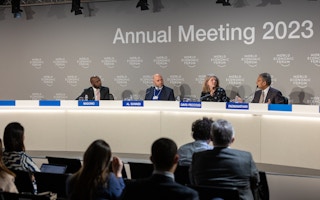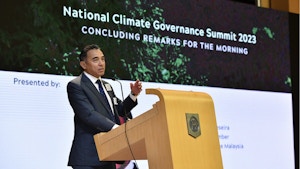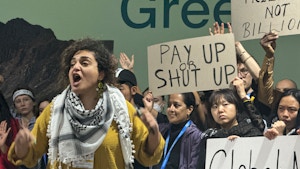COP28’s director general Majid Al Suwaidi has declared that the upcoming climate talks to be hosted in Dubai later this year will be inclusive and open to everyone.
To continue reading, subscribe to Eco‑Business.
There's something for everyone. We offer a range of subscription plans.
- Access our stories and receive our Insights Weekly newsletter with the free EB Member plan.
- Unlock unlimited access to our content and archive with EB Circle.
- Publish your content with EB Premium.
“Everybody will be welcome at the table… we encourage you to come, our only ask is that you come with solutions and real actions,” he said at a briefing on Thursday at the World Economic Forum in Davos.
“[We want] solutions, actions, real things that will get us back on track to achieving the goals of the Paris Agreement because that is our laser focus,” he said. “Nobody is going to be barred… everyone who wants to contribute constructively should be allowed to participate because this is a fantastic convening platform”.
At the last United Nations climate talks in Egypt, some environmental campaigners complained that they were shut out of negotiations, while some activists were blocked from attending the G20 Summit in Indonesia in November.
Al Suwaidi, who is Special Representative of the United Nations Climate Change Conference (COP28), Office of the Special Envoy for Climate Change of the United Arab Emirates, also defended the recent controversial decision to appoint Sultan Ahmed Al Jaber as COP28 president.
The appointment of Al Jaber, who is currently the chief executive officer of the Abu Dhabi National Oil Company (ADNOC), sparked an international outcry last week, as some campaigners pointed to a conflict of interest between his role as COP28 president and his job as the energy company chief.
ADNOC is the world’s 12th biggest oil company. It reportedly plans to increase production from 4 million barrels per day in 2021 to 5 million barrels per day by 2025, as the UAE capitalises on its oil reserves ahead of a transition to clean energy.
Tasneem Essop, executive director of Climate Action Network International, tweeted in reaction that “this is tantamount to a full-scale capture of the UN climate talks by a petrostate national oil company and its associated fossil fuel lobbyists.”
The UAE has since confirmed that Al Jaber will retain his role as head of the country’s state oil company and sustainable energy businesses. He is also the UAE’s minister for industry and advanced technology.
Speaking in Davos at a briefing on building momentum towards COP28, Al Suwaidi took pains to point out that Al Jaber is “perfectly placed” to oversee the COP28 process. ADNOC is also one of the world’s largest renewable energy providers globally, and Al Jaber had been “instrumental in our country’s energy transition, diversifying from oil and gas,” he added.
“He is the first CEO COP president… we’ve never had a CEO president before. He understands government, he understands the private sector, he has delivered [renewable energy] projects… I am very confident that people will see that we are going to deliver a process that’s open and inclusive,” he told Eco-Business.
Also speaking at the briefing, Paddy Padmanathan, vice chairman and chief executive officer at Saudi energy firm Acwa Power, echoed the sentiment, noting that Al Jaber has a track record “in implementing renewable energy at scale and accelerating that”.
“[His appointment at ADNOC] was a very clear signal to me that… [he was asked to] help accelerate the decarbonisation of that oil and gas company,” he added.
Alongside Al Jaber, two other women have been appointed to lead the UAE’s COP28 presidency: Shamma al-Mazrui, minister of state for youth affairs, as Youth Climate Champion; and Razan al-Mubarak, president of environmental group the International Union for Conservation of Nature as UN Climate Change High-Level Champion.
COP28 is set to be a milestone meeting as the results of the first ever Global Stocktake (GST) as mandated by the Paris Agreement will be released at the summit in November. The GST aims to assess the advances made so far in mitigating and adapting to climate change, and will continue to be conducted every five years after 2023 to monitor any further progress.
Al Suwaidi said the UAE were “custodians” of this process and will build on the work of the last global climate change meeting. Referring to COP27, which was hosted by Egypt in Sharm El Sheikh last November, he said “our Egyptian colleagues delivered… especially when it came to the loss and damage fund”.
“
Nobody is going to be barred… everyone who wants to contribute constructively should be allowed to participate because this is a fantastic convening platform.
COP28’s director general Majid Al Suwaidi
“COP28 is where we’re delivering this global stock take and that means that we have to deliver a balanced outcome across mitigation, adaptation, loss and damage and finance,” he said.
The UAE will focus on driving ambition between countries and the private sector, he said. “We’ve always been very good at bringing government and the private sector together to deliver big projects and that’s definitely what we’re going to do here.”
“If we can bring these two worlds together with civil society and non-state actors, we can deliver big results,”
Al Suwaidi also said the UAE is looking at voluntary carbon markets, where the “standards are not clear” and that the guidance around how to use offsets in net zero strategies need to be clarified.
Padmanathan noted that the Middle East as a region might have come “late to the party” in implementing large scale renewable energy investments, but that “now we have started, we’re doing that at scale”.
He said that Middle Eastern energy firms are investing in new technologies that are reducing the carbon fooprint of the fossil fuels “that we are extracting and that we absolutely have to continue to supply to the world” while investing in the transition to rebalance its own fuel mix.
The company in October had signed a memorandum of understanding (MoU) with the Industrial Development Corporation of South Africa (IDC) to develop green hydrogen and its derivatives in South Africa at a potential estimated size of US$10 billion.
He noted that there are studies now looking into building cross power lines from Africa into Europe, transition power lines into India and to expand renewable energy capacity and competency.
Noting the significance of COP28 being hosted by the UAE, he added, “The Middle East will play a very dominant role in this energy transition and it will do it because it recognises its responsibility, but also because it’s a compelling value proposition.”
This story is part of Eco-Business’ coverage of the World Economic Forum Annual Meeting in Davos.














